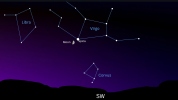army judge
Super Moderator
No Telescope? No Problem

You don't need professional equipment to enjoy the Buck Moon. The best way to see it might just be with your own two eyes. But if you do have a pair of binoculars or a small telescope, you'll be able to spot craters, valleys, and the vast dark plains known as lunar maria.
For an even more meaningful experience, consider turning your lunar viewing into a little celebration. Invite friends or family, bring snacks, and talk about what you see. The moon has been a source of storytelling, poetry, and scientific discovery for thousands of years — why not make it part of your summer evening?
Celebrating a Legacy: Apollo 11 Anniversary
There's another reason July's full moon is extra special: it arrives just days before the 56th anniversary of the Apollo 11 moon landing. On July 20, 1969, Neil Armstrong and Buzz Aldrin made history by becoming the first humans to walk on the moon.To honor that moment, use this Buck Moon as an opportunity to locate the Sea of Tranquility, where Apollo 11 touched down. With a telescope, you may even be able to see the bright area where the lander's descent stage remains — a quiet monument to human ambition and innovation.
This historical connection adds even more weight to your moonwatching, reminding us that this beautiful, glowing disk in the sky was once a destination — and may be again.
Conclusion
The 2025 Buck Moon offers more than a pretty photo. It's a reminder that even common events like a full moon can be filled with complexity, wonder, and cosmic choreography. From its distant position in space to its low arc in the sky, it shows us that astronomy is not just about distant galaxies — it's about understanding how we fit into the solar system's rhythms right here, right now.It also invites us to slow down, take notice, and reconnect — with the Earth, the skies, and each other. In a world where we're often rushing, pausing to watch the moonrise can be an act of reflection, curiosity, and joy.

July 2025 Buck Moon: A Celestial Spectacle You Can’t Miss | NASA Space News
Don’t miss the Buck Moon on July 10, 2025, the farthest full moon from the Sun this year! Discover why this rare lunar event is a must-see, and it is so unique.
